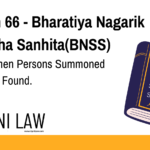CrPC Section 472: Continuing Offences Explained
1. State the Code
Section 472 of the Code of Criminal Procedure (CrPC) deals with “Continuing Offences”.
2. Explanation
This section defines an offence as “continuing” when it is committed, not in a single act, but by a series of acts, or by a continued state of things. In such cases, the offence is considered to be committed on each day that the act or state continues.
3. Illustration
- Example 1: A person illegally occupies a land for a month. The offence of trespass is considered “continuing” for the entire month. Each day of occupation constitutes a separate offence.
- Example 2: A shopkeeper continues to sell adulterated milk for a week. The offence of selling adulterated food is considered “continuing” for the entire week. Every day of selling adulterated milk constitutes a separate offence.
4. Common Questions and Answers
Q: What is the significance of a continuing offence?
A: It allows the prosecution to charge a person with multiple offences for a single act or state, if it continues for a period of time.
Q: Can a person be prosecuted for a continuing offence more than once?
A: Yes, a person can be prosecuted for a continuing offence on each day that the act or state continues, provided that the prosecution is for a distinct offence. For instance, in the example of the shopkeeper selling adulterated milk, the shopkeeper could be prosecuted for selling adulterated milk on each day that he continued to sell it.
Q: Can a person be acquitted for a continuing offence?
A: Yes, if the prosecution fails to prove the elements of the offence for any specific day, the accused can be acquitted for that specific day. However, the prosecution can still bring charges for other days on which the act or state continued.









